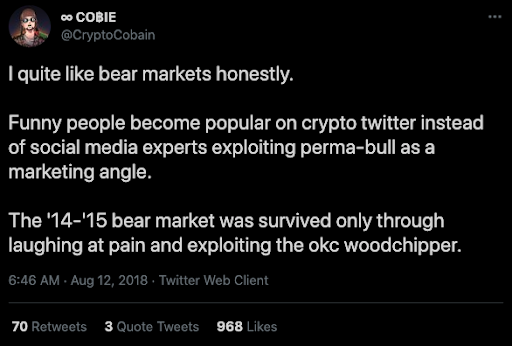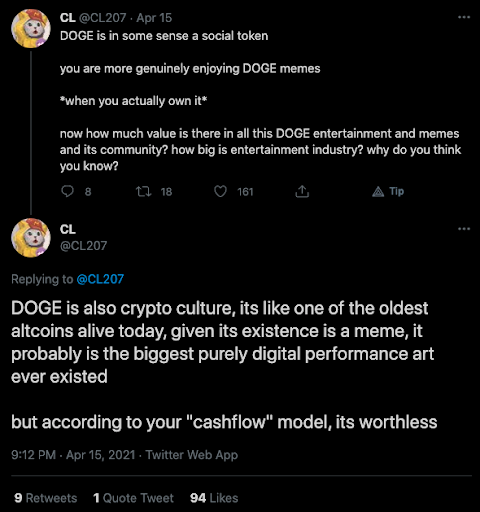Laughter without a tinge of philosophy is but a sneeze of humor. Genuine humor is replete with wisdom. – Mark Twain
Most of what I say is useful if you understand how to interpret low level unprofessional shitposting. – Loomdart
I’m the person many of my friends, coworkers, and family turn to when they have questions about crypto. I field those great questions about whether or not Cardano and Ripple are legit.
I try to be as helpful as I can, but over the years I’ve settled on outsourcing these questions by:
- Kindly telling people they should do their own research by reading certain introductory articles
- Providing a helpful list of crypto people to follow on Twitter that offer free analysis and insight
Lately, I’ve reflected on the Twitter list and its absurdity. “Yes, follow the avatar with the Duck. Really sober takes on potentially large market moves. The guy with the old-dude avatar has the best educational resources. The Cobain tribute avatar hosts a podcast with some of the most giga-brain people in the industry. And that account that occasionally retweets hentai? Outstanding DeFi takes”.
95% of the people I send this info to never give me feedback, as you might expect. People want crypto to be serious and my recommendations tend to be anything but that.
But the people that have listened and taken the time to dive into crypto Twitter generally come back with two reactions: “these people are helpful” and “these people are hilarious”.
The second reaction is what I’ve been thinking about lately. Why do many of the best crypto investors, educators, and personalities tend to be shitposters with a sense of humor?
You could make an argument that part of it is selection bias. If you got into this industry early and became successful, there was a good chance you weren’t taking yourself too seriously. If you were one of the people wiring money to Mt. Gox in 2012 for BTC or buying the ETH ICO in the middle of the 2015 bear market to the degree that you are now set for life, you had to embrace the preposterous nature of the moment.
There was always a bull case, but you were still investing significant amounts of money into what we lovingly called “magic internet money”. You likely realized you were gambling and that if it all went to zero, you had no one to blame but yourself for thinking it was a good idea. And you were probably at peace with that.
What happened when these gamblers hit it rich? Well, they suddenly had all the time in the world to sit back, relax, and shitpost. Or as a more eloquent market observer once put it:
However, this history doesn’t fully explain the phenomenon. There are plenty of newer, high-profile crypto accounts that are just as dedicated to shitposting as their older compatriots that have already “made it”. What’s driving them to this type of posting?
Part of the explanation may be coping with the inevitable tragedies of cryptocurrency. For a market that has historically only gone up, it has also chewed up and ruined countless traders and investors in record time. It’s easy to gamble more than you can afford to lose, and when the music stops, nothing punishes your greed quite like crypto.
The symbiotic relationship between tragedy and comedy has been speculated about for ages, and a modern manifestation of this theory can be found in the general crypto Twitter consensus that bear markets produce higher quality content:
When you’re down 98% on Cummies, all you can do is laugh.
But I still don’t believe that bear market coping and the industry’s degenerate foundation alone explain why the crypto space is so driven by humor. At the most fundamental level, I believe this space is funny because it needs to be to survive.
Why is this? In a marketplace with no central authority, humans must fall back on their most basic social instincts. And one of the most basic trust mechanisms in human culture is humor. We use the social cues of shared jokes to understand who can be trusted, who’s a newbie learning the ropes, and who’s a Fed.
Inside jokes create a cultural moat that both protects the community from outsider attacks and strengthens it by giving existing members a sense of belonging. It also makes everything look completely ridiculous from the outside:
The importance of humor in crypto also goes well beyond the way that the community interacts. Humor is part of the investing experience as well.
We’re still in crypto’s big bang phase. We’re all floating around in the void trying to figure out what projects will survive and coalesce into something permanently powerful and what will fade away.
The people with industry experience know that one of the best tricks to navigating this expanse of shit projects is to understand how humor plays a part in building a community:
This movement of humor driven investing in crypto is happening against the backdrop of a collective backlash against the status quo. The GameStop/AMC “stonk” pumps and declining faith in the media and governmental institutions are indicative of an atmosphere where people are continuing to question the institutional dogmas they were raised to respect. Even business news anchors are starting to ask, why not Dogecoin?
So, what can we learn from all of this? These are the main points you should remember:
- To those who have been in crypto for years and continue to complain about it not being serious enough and needing to “grow up”, you’ve lost the plot. If anything this space will grow more absurd as humor and in-jokes continue to be one of the most efficient ways of sharing knowledge and sorting out trust between increasingly anon participants. The irreverent culture of crypto will also continue to give the industry a leg up on traditional investing opportunities as the trend of questioning previously-accepted societal norms accelerates. So ask yourself, do you want to be right? Or do you want to make money?
- To the new participants, abandon what you think about finance needing to be a stale and responsible topic. You’re never going to find that here, and if someone pitches a project that way, it’s probably a scam. The faux sense of seriousness that you’re trained to put on when you want to participate in modern business settings is not needed. If you leave your expectations at the door, you can educate yourself and participate in any community you want to. Have fun, make some friends, and make some money.
Embrace the ridiculousness because:






